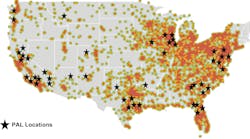The AAA Clubs of Minnesota are denouncing a study conducted by the Minnesota Dept. of Transportation (MNDOT) that looked at increased commercial truck size and weight limits as a way to reduce traffic congestion.
“MNDOT proposes allowing heavier trucks on Minnesota roads as long as they have more axles, so instead of an 80,000-lb limit, a typical semi could weigh as much as 97,000 lb with seven axles, or, with a twin trailer, up to 108,000 lb with eight axles,” said Steve Frank, president & CEO of Minneapolis AAA.
“MNDOT says that more freight on a truck with more axles leads to fewer trips, less wear and tear on the road and, with fewer ‘interactions’ between cars and trucks, a safer highway system too,” Frank continued. “That's balderdash. Trucks that big traveling on state roads are 300% to 400% more dangerous than they would be on the Interstate system … and they’re more likely to rollover, they’re harder on bridges and they’re noisier, too.”
MNDOT’s “Truck Size and Weight Project” is getting a lot of negative feedback from other groups, too, including the Minnesota State Troopers Assn., the Minnesota Police and Peace Officers Assn., the Minnesota Transportation Alliance.
“We disagree with MNDOT’s proposal because we believe larger, heavier trucks will increase deaths and injuries, while also worsening traffic congestion and intensifying road wear,” said AAA’s Frank.


